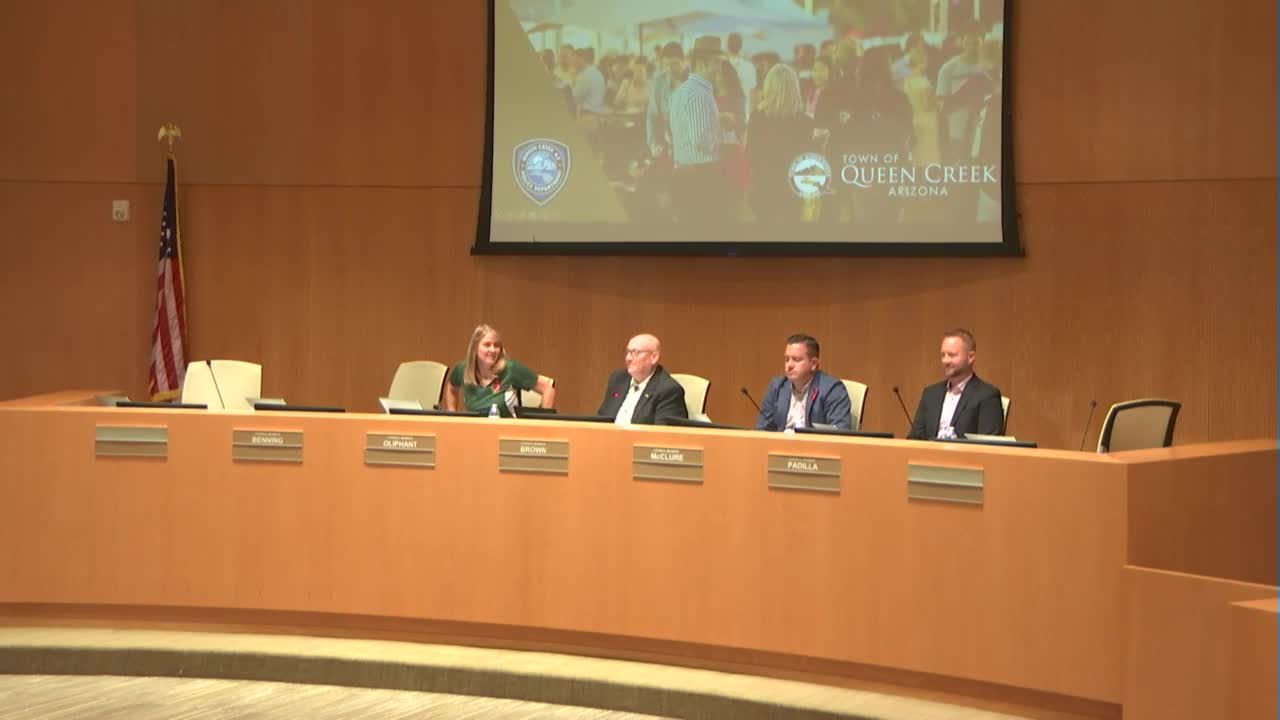Queen Creek council adopts special‑events permitting ordinance after debate over amplified‑sound rules; vote 4‑1
Get AI-powered insights, summaries, and transcripts
Subscribe
Summary
The Town Council voted 4‑1 to adopt Ordinance 876‑25 creating a new special‑events permitting chapter and amending offenses; debate focused on amplified sound standards, submittal timelines and enforcement mechanisms.
The Queen Creek Town Council voted 4‑1 on Oct. 15 to adopt Ordinance 876‑25, a code amendment that adds a chapter on special events and updates related offenses intended to create a single, townwide permitting framework for intermittent events on public and private property.
The ordinance defines special events as intermittent activities of up to four consecutive days that are inconsistent with a property’s zoning or usual use and enumerates categories that may require a permit, including events that deviate from permitted land use, affect public roadways or access, involve fireworks or pyrotechnics, use amplified sound, or require a state liquor license.
Chief Bridal, who presented the ordinance on behalf of the police department, said the town previously relied on department policy for events on town property but lacked a codified mechanism for events on private property that nevertheless affect public safety or public ways. “When in doubt, submit an application,” Bridal told the council, urging early planning and describing staff’s intent to guide organizers through the process. He said the goal is to “find a way to say yes” while ensuring public safety.
Council debate focused most heavily on the ordinance’s treatment of amplified sound. Councilmember Padilla and others raised concerns that the current wording is vague and could unintentionally require routine backyard or community events to seek permits. Padilla asked whether decibel thresholds exist in the code; staff said existing noise rules rely on an “unreasonable noise” standard and that the permitting system would allow town staff to set mitigation conditions (hours, speaker orientation, decibel limits) for large events.
Key procedural details included in staff’s presentation: - Standard submittal windows: 60 days for major events, 30 days for tournaments, and 14 calendar days for block parties (staff said shorter submissions could be considered but risk denial). - Administrative review: applications routed to an internal review committee with representatives from affected departments; a permit administrator issues approvals, denials or approvals with conditions. - Enforcement and penalties: staff said enforcement would begin with outreach and warnings, escalate to civil citations and permit revocation for noncompliance, and only in extreme, repeated noncompliance move to misdemeanor charges. Revocations would require event cessation and restore conditions as practical. - Cost recovery: the code would allow the town to recover costs for cleanup, emergency response or property damage when appropriate; staff said initial adoption does not include new permit fees, though an expedited‑processing fee could be considered later.
On appeals, Bridal said applicants may appeal a denial or revocation to the town manager (or designee) within seven days; the appeal process does not change judicial review of any civil or criminal citations issued by police.
Motion and vote: Councilmember Brown moved to approve Ordinance 876‑25 as presented; the council then voted with four members in favor and one opposed. Staff said they will return with implementation materials, an online guide and liaisons to help organizers determine whether a permit is needed and how to apply.
Why it matters: the ordinance creates a single local permitting framework intended to reduce ad hoc public‑safety deployments for large private gatherings that affect roadways, require traffic control or present other public‑safety impacts. Councilmembers asked staff to provide examples and clear guidance so residents understand which gatherings need permits and which do not.
Ending: Chief Bridal and staff said they will produce FAQs, a website guide and staff liaisons to help residents and organizers determine permitting needs; the council requested a six‑month implementation update.
